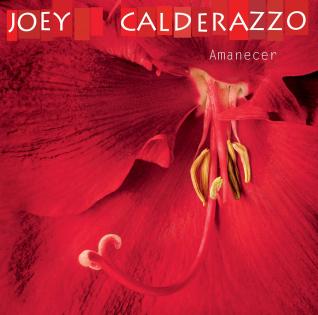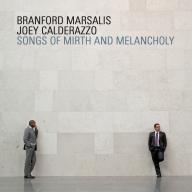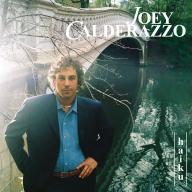If Haiku, Joey Calderazzo’s previous Marsalis Music release and first recording comprised completely of solo performances, was a significant milestone in the career of the acclaimed pianist, then Amanecer must be counted as equally momentous. Recorded in January 2006 and produced by Calderazzo’s longtime leader and friend Branford Marsalis, the album captures Calderazzo’s ongoing progress as a solo artist while also placing him in the new context of duos and trio encounters with vocalist Claudia Acuña and guitarist Romero Lubambo.
In addition to his continuing work with Marsalis, which has brought him to the top ranks of contemporary pianists, Calderazzo attributes his further evolution to expanded listening and more opportunities to perform in the solo context. “I’ve been studying much more music, which has opened up different possibilities,” he reports. “I’m listening to more and different classical music – Rachmaninoff and Stravinsky, and a lot of Glenn Gould playing Brahms – which has clearly fed the romantic side of my music. And, especially in playing with Branford, I’ve been dealing with more historical jazz styles. Jazz is not easy to play, but all of this research has made it easier for me, in the sense that I’m much more comfortable in a variety of styles. Branford’s band played “Mood Indigo” recently, and I was more comfortable with that piece than I’ve ever been, which I’m sure comes from my listening to Nat Cole and other pianists who came before bebop.”
The opportunity to appear as a solo pianist at clubs and festivals, and in particular the extensive European solo tour that immediately preceded the sessions for Amanecer, also left Calderazzo with a new philosophy of performance. “I could always execute in the past,” he explains, “because my technique has always been good enough to play what I was hearing. Now I’ve reached a crossroads, because I’m starting to hear things that I can’t always play; but I’ve also come to realize that ‘playing better’ in the sense of executing a particular passage better does not always mean that the overall performance is improved. The perfect technical take is not always the perfect musical take. I could see these ideas coming together on that January tour, where my solo playing really changed. So I went into the studio with a list of songs I wanted to play and the experience I gained from playing them on the road, but for the most part without a rigid idea of how to approach each piece. The approach may be more hit or miss, but the commitment is to allowing each attempt to stand on its own.”
A perfect example is the album’s opening track, “Midnight Voyage,” which Calderazzo first introduced on the late Michael Brecker’s 1996 recording Tales from the Hudson. “That’s probably my most popular composition. Three or four other people have recorded it, and people are always requesting it on my solo gigs. While I feel entitled to take liberties with anybody’s music, I really am entitled to take liberties with my own, and ‘Midnight Voyage’ is one of my tunes that I felt the need to personalize. I think I succeeded; but I also think that if people could hear this version and two other takes, it might sound like three different tunes.”
“Toonay,” first heard in a trio version on Calderazzo’s self-titled Columbia disc from 1999, is another example of a performance that the pianist considers “superior by leaps and bounds from the earlier version. It shows where I’m headed, toward music where the pulse is there without having to nail it, and where my two hands can function more like two people playing at once. It’s not a perfect performance, but I hear sections of ideas that I could build upon for years.”
Among the other unaccompanied titles are the standard “I’ve Never Been in Love Before,” Bill Evans’ classic “Waltz for Debby” (“the one tune that had a built-in arrangement”) and Michael Brecker’s “Sea Glass.” “I’ve always loved ‘Sea Glass,’ but never interpreted it to my satisfaction when I played it with Mike,” Calderazzo admits. “I’ve been playing the tune in a trio setting for a few years, and had always wanted to get to it as a piano solo. Branford gave me the idea of how to approach it that really worked.”
The remaining four titles feature the brilliant Chilean vocalist Acuña and/or Brazilian guitar giant Lubambo, and reinforce the growth in lyricism that Calderazzo revealed on Haiku. “I find that I can’t do justice to some of the songs I write as a solo pianist,” he insists. “Some, even older things like ‘Amanecer’, are really meant for a singer. I was showing Claudia some of the things I was working on backstage at the Monterey festival, where we both performed, and she was so quick singing things back to me that I knew she would be perfect for this album. The honesty of her voice fits with the honesty of the tunes. And I love acoustic guitar and bossa novas. Playing with Claudia and Romero really underscores my love of songs, and reminds me that the Beatles, who I grew up listening to, have had as much if not more of an impact on my music than John Coltrane.”
Calderazzo and Acuña are heard in a duo performance of “So Many Moons,” while Lubambo joins the pianist for “The Lonely Swan,” which made its debut as a quartet piece on the Marsalis Music disc Eternal. Piano, guitar and voice all appear on “Amanecer,” which Calderazzo originally recorded as “Cat’s Cradle” on Brecker’s 1997 album Two Blocks from the Edge and which now includes Spanish lyrics by Acuña, and “Lara”.
“The three of us are going to tour after the album is released,” Calderazzo says of his new partners. “By then, I will have gotten even deeper into this new approach. My sound is already considerably better than it has been, and I also want to expand upon some new feelings that I hear in the music. One thing I like about playing solo is that both the good and the bad come out, which is a great way to accomplish something in music. My goal is to get to the point where the piano doesn’t get in the way.” On the evidence of Amanecer, Joey Calderazzo has already reached that point, and is moving forward.


